Curriculum Design Report: Analysis, Evaluation, and Improvement
VerifiedAdded on 2023/06/08
|21
|6015
|289
Report
AI Summary
This report provides a comprehensive analysis of curriculum design and development, focusing on the purpose, approaches, and models used in the process. It evaluates the importance of learner feedback in shaping curriculum and strategies for managing risks during development. Methodologies for monitoring and evaluating curriculum effectiveness are also assessed. Furthermore, the report justifies learning outcomes, assessment methods, and resources needed for successful curriculum design in education and training programs. It evaluates the achievement of learning outcomes, delivery methods, and identifies areas for improvement, offering a thorough overview of enhancing education and training syllabi. Desklib offers a range of similar resources for students.
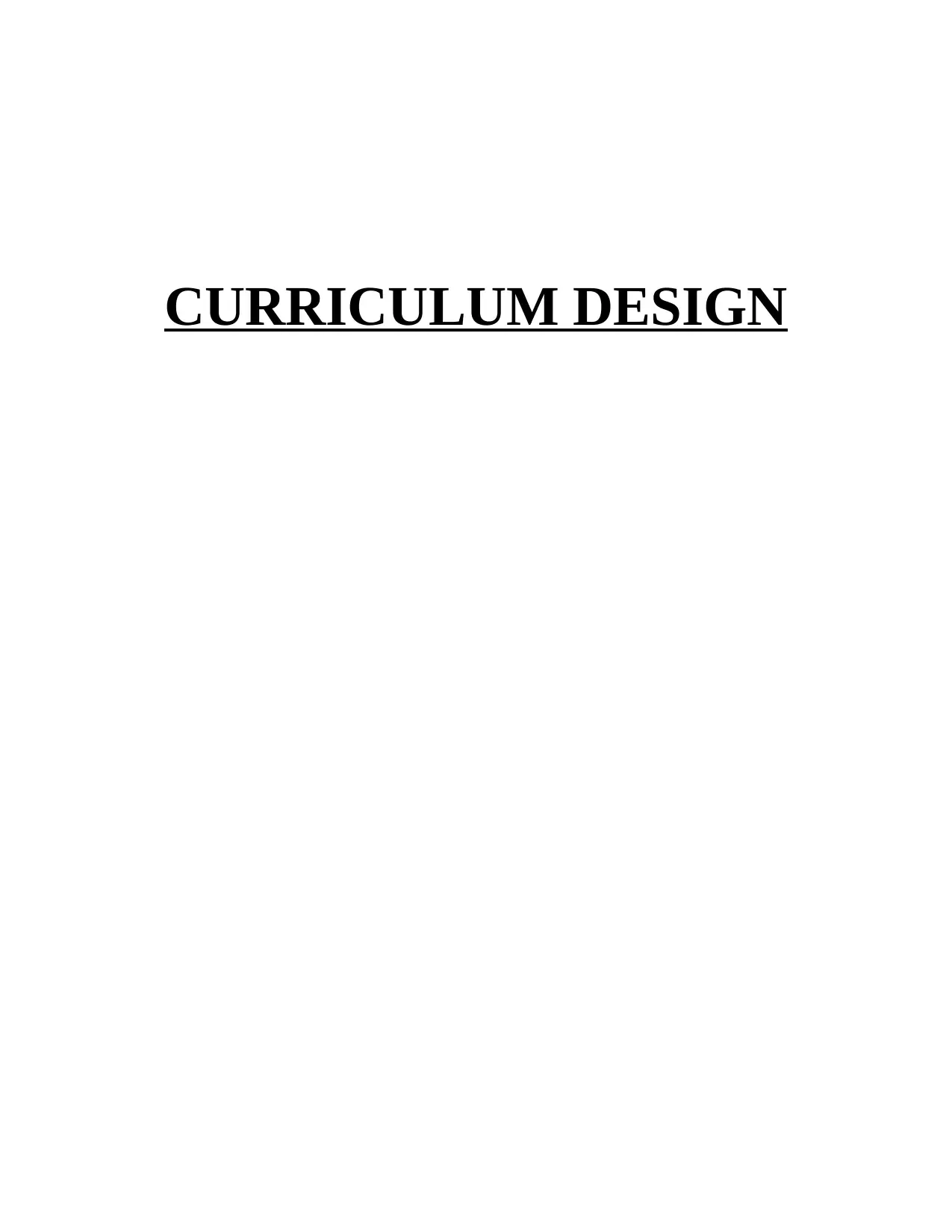
CURRICULUM DESIGN
Paraphrase This Document
Need a fresh take? Get an instant paraphrase of this document with our AI Paraphraser
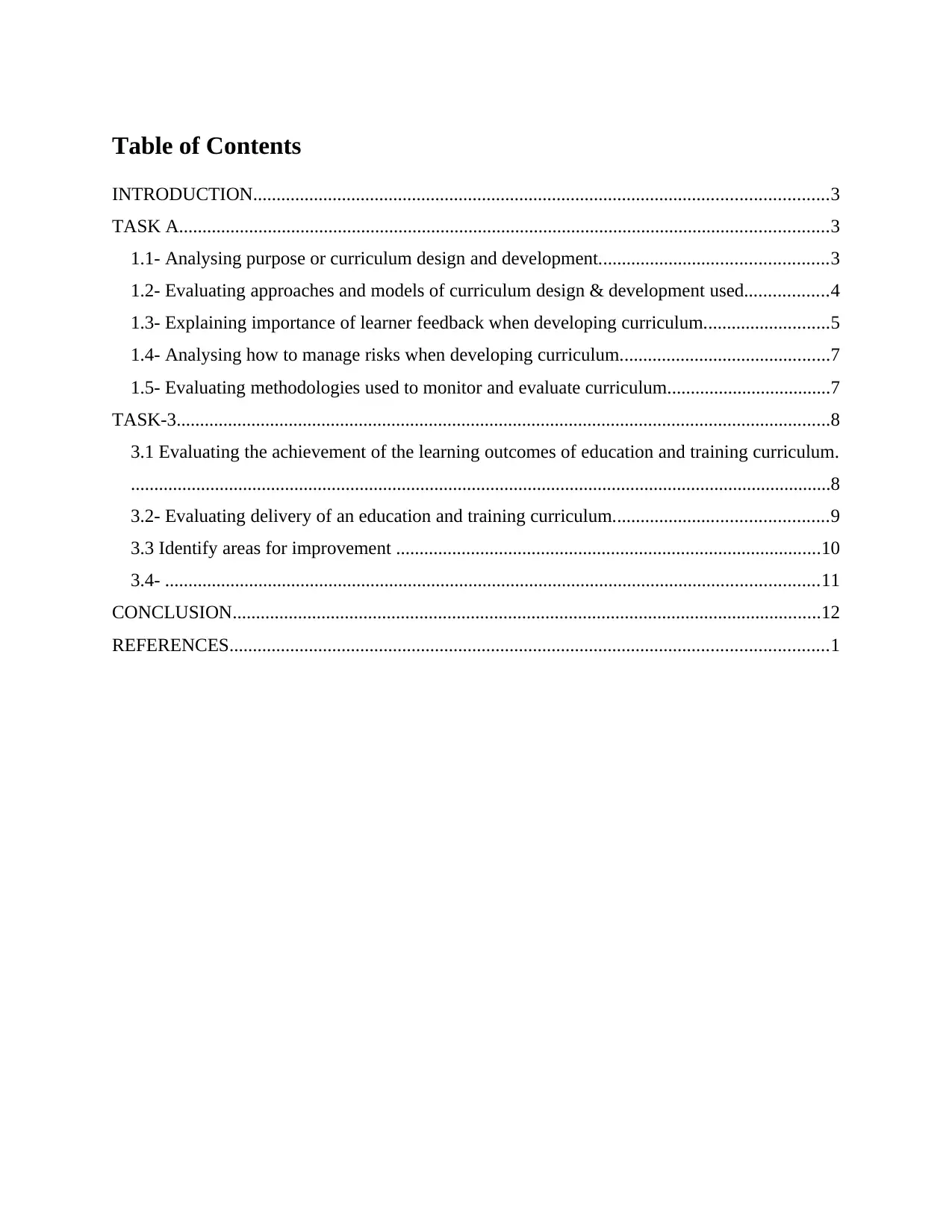
Table of Contents
INTRODUCTION...........................................................................................................................3
TASK A...........................................................................................................................................3
1.1- Analysing purpose or curriculum design and development.................................................3
1.2- Evaluating approaches and models of curriculum design & development used..................4
1.3- Explaining importance of learner feedback when developing curriculum...........................5
1.4- Analysing how to manage risks when developing curriculum.............................................7
1.5- Evaluating methodologies used to monitor and evaluate curriculum...................................7
TASK-3............................................................................................................................................8
3.1 Evaluating the achievement of the learning outcomes of education and training curriculum.
......................................................................................................................................................8
3.2- Evaluating delivery of an education and training curriculum..............................................9
3.3 Identify areas for improvement ...........................................................................................10
3.4- ............................................................................................................................................11
CONCLUSION..............................................................................................................................12
REFERENCES................................................................................................................................1
INTRODUCTION...........................................................................................................................3
TASK A...........................................................................................................................................3
1.1- Analysing purpose or curriculum design and development.................................................3
1.2- Evaluating approaches and models of curriculum design & development used..................4
1.3- Explaining importance of learner feedback when developing curriculum...........................5
1.4- Analysing how to manage risks when developing curriculum.............................................7
1.5- Evaluating methodologies used to monitor and evaluate curriculum...................................7
TASK-3............................................................................................................................................8
3.1 Evaluating the achievement of the learning outcomes of education and training curriculum.
......................................................................................................................................................8
3.2- Evaluating delivery of an education and training curriculum..............................................9
3.3 Identify areas for improvement ...........................................................................................10
3.4- ............................................................................................................................................11
CONCLUSION..............................................................................................................................12
REFERENCES................................................................................................................................1
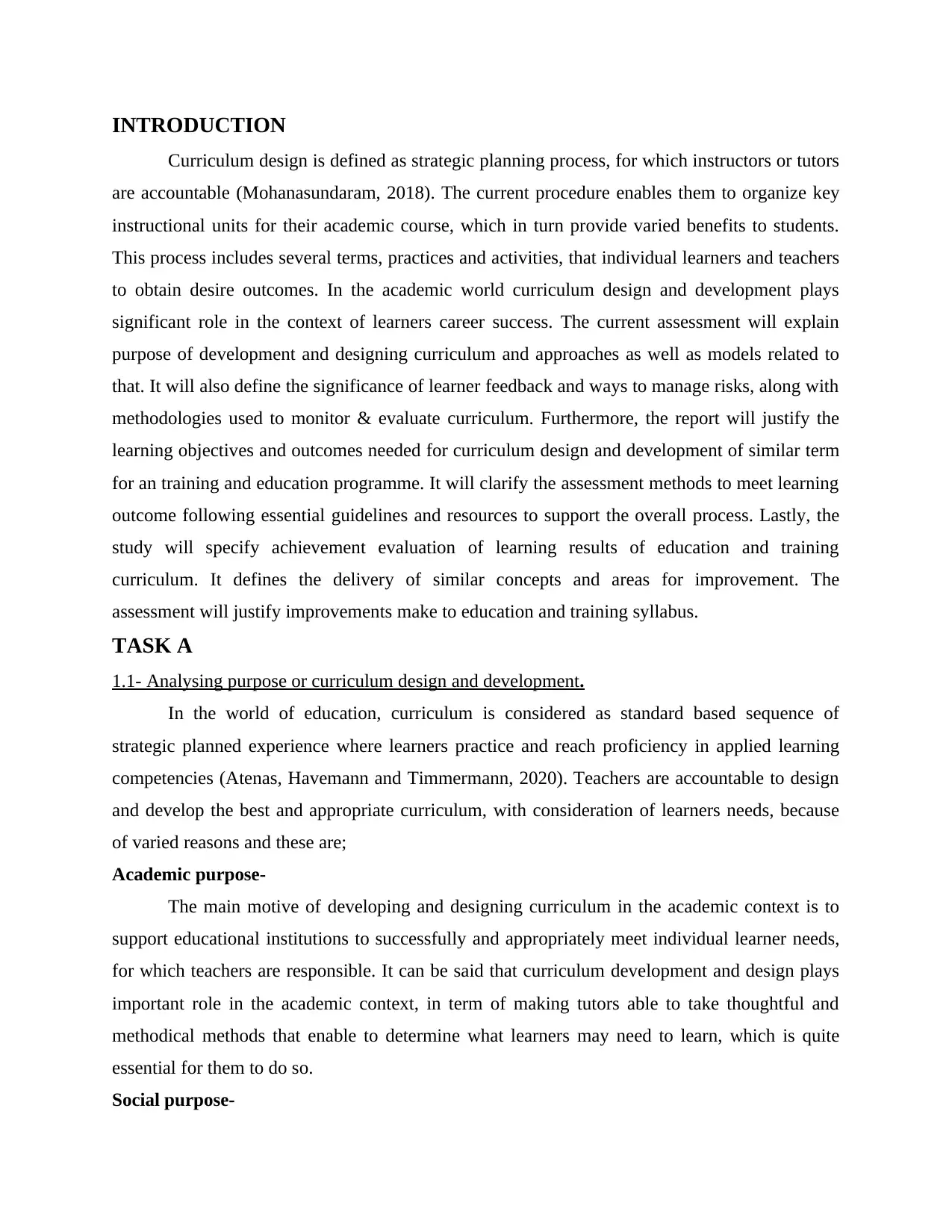
INTRODUCTION
Curriculum design is defined as strategic planning process, for which instructors or tutors
are accountable (Mohanasundaram, 2018). The current procedure enables them to organize key
instructional units for their academic course, which in turn provide varied benefits to students.
This process includes several terms, practices and activities, that individual learners and teachers
to obtain desire outcomes. In the academic world curriculum design and development plays
significant role in the context of learners career success. The current assessment will explain
purpose of development and designing curriculum and approaches as well as models related to
that. It will also define the significance of learner feedback and ways to manage risks, along with
methodologies used to monitor & evaluate curriculum. Furthermore, the report will justify the
learning objectives and outcomes needed for curriculum design and development of similar term
for an training and education programme. It will clarify the assessment methods to meet learning
outcome following essential guidelines and resources to support the overall process. Lastly, the
study will specify achievement evaluation of learning results of education and training
curriculum. It defines the delivery of similar concepts and areas for improvement. The
assessment will justify improvements make to education and training syllabus.
TASK A
1.1- Analysing purpose or curriculum design and development.
In the world of education, curriculum is considered as standard based sequence of
strategic planned experience where learners practice and reach proficiency in applied learning
competencies (Atenas, Havemann and Timmermann, 2020). Teachers are accountable to design
and develop the best and appropriate curriculum, with consideration of learners needs, because
of varied reasons and these are;
Academic purpose-
The main motive of developing and designing curriculum in the academic context is to
support educational institutions to successfully and appropriately meet individual learner needs,
for which teachers are responsible. It can be said that curriculum development and design plays
important role in the academic context, in term of making tutors able to take thoughtful and
methodical methods that enable to determine what learners may need to learn, which is quite
essential for them to do so.
Social purpose-
Curriculum design is defined as strategic planning process, for which instructors or tutors
are accountable (Mohanasundaram, 2018). The current procedure enables them to organize key
instructional units for their academic course, which in turn provide varied benefits to students.
This process includes several terms, practices and activities, that individual learners and teachers
to obtain desire outcomes. In the academic world curriculum design and development plays
significant role in the context of learners career success. The current assessment will explain
purpose of development and designing curriculum and approaches as well as models related to
that. It will also define the significance of learner feedback and ways to manage risks, along with
methodologies used to monitor & evaluate curriculum. Furthermore, the report will justify the
learning objectives and outcomes needed for curriculum design and development of similar term
for an training and education programme. It will clarify the assessment methods to meet learning
outcome following essential guidelines and resources to support the overall process. Lastly, the
study will specify achievement evaluation of learning results of education and training
curriculum. It defines the delivery of similar concepts and areas for improvement. The
assessment will justify improvements make to education and training syllabus.
TASK A
1.1- Analysing purpose or curriculum design and development.
In the world of education, curriculum is considered as standard based sequence of
strategic planned experience where learners practice and reach proficiency in applied learning
competencies (Atenas, Havemann and Timmermann, 2020). Teachers are accountable to design
and develop the best and appropriate curriculum, with consideration of learners needs, because
of varied reasons and these are;
Academic purpose-
The main motive of developing and designing curriculum in the academic context is to
support educational institutions to successfully and appropriately meet individual learner needs,
for which teachers are responsible. It can be said that curriculum development and design plays
important role in the academic context, in term of making tutors able to take thoughtful and
methodical methods that enable to determine what learners may need to learn, which is quite
essential for them to do so.
Social purpose-
⊘ This is a preview!⊘
Do you want full access?
Subscribe today to unlock all pages.

Trusted by 1+ million students worldwide
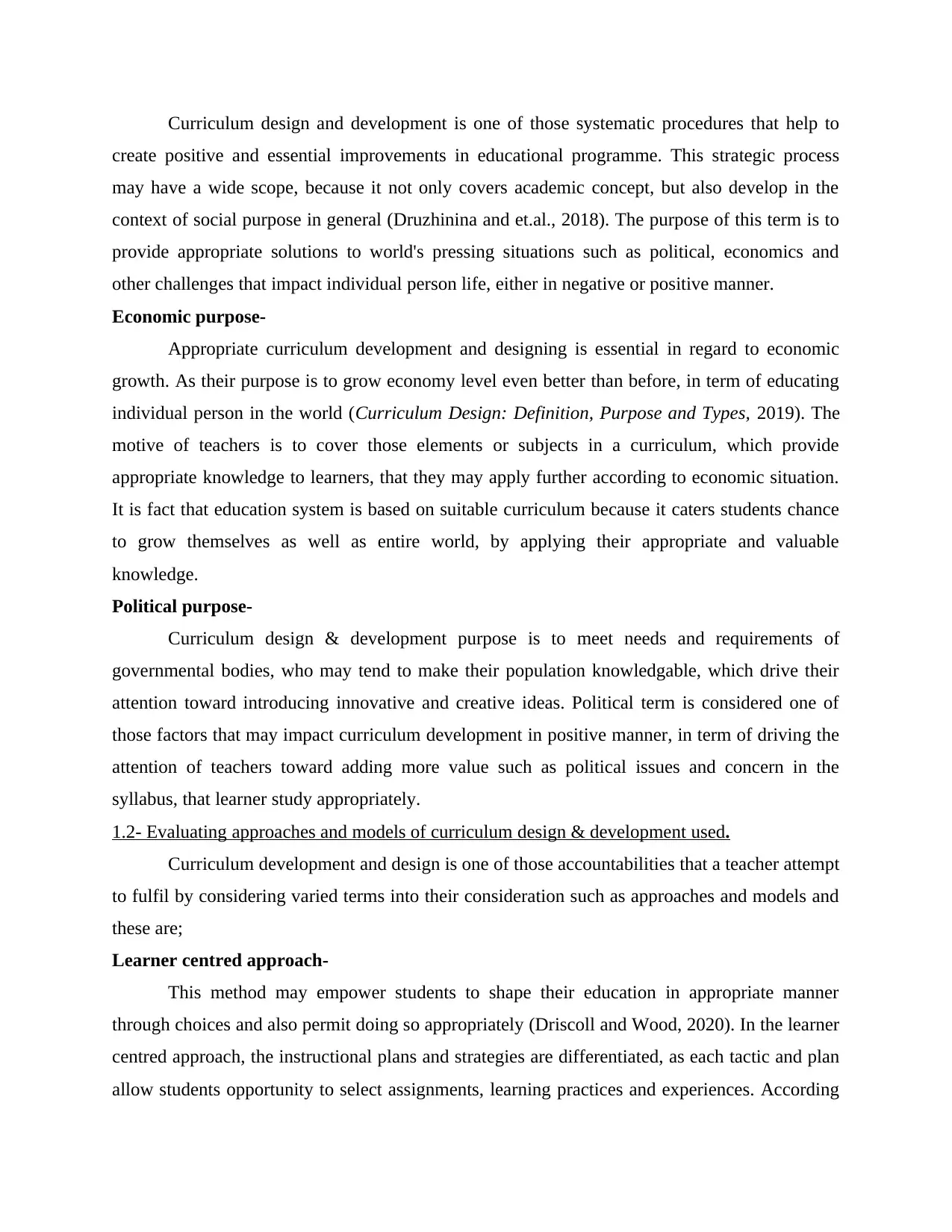
Curriculum design and development is one of those systematic procedures that help to
create positive and essential improvements in educational programme. This strategic process
may have a wide scope, because it not only covers academic concept, but also develop in the
context of social purpose in general (Druzhinina and et.al., 2018). The purpose of this term is to
provide appropriate solutions to world's pressing situations such as political, economics and
other challenges that impact individual person life, either in negative or positive manner.
Economic purpose-
Appropriate curriculum development and designing is essential in regard to economic
growth. As their purpose is to grow economy level even better than before, in term of educating
individual person in the world (Curriculum Design: Definition, Purpose and Types, 2019). The
motive of teachers is to cover those elements or subjects in a curriculum, which provide
appropriate knowledge to learners, that they may apply further according to economic situation.
It is fact that education system is based on suitable curriculum because it caters students chance
to grow themselves as well as entire world, by applying their appropriate and valuable
knowledge.
Political purpose-
Curriculum design & development purpose is to meet needs and requirements of
governmental bodies, who may tend to make their population knowledgable, which drive their
attention toward introducing innovative and creative ideas. Political term is considered one of
those factors that may impact curriculum development in positive manner, in term of driving the
attention of teachers toward adding more value such as political issues and concern in the
syllabus, that learner study appropriately.
1.2- Evaluating approaches and models of curriculum design & development used.
Curriculum development and design is one of those accountabilities that a teacher attempt
to fulfil by considering varied terms into their consideration such as approaches and models and
these are;
Learner centred approach-
This method may empower students to shape their education in appropriate manner
through choices and also permit doing so appropriately (Driscoll and Wood, 2020). In the learner
centred approach, the instructional plans and strategies are differentiated, as each tactic and plan
allow students opportunity to select assignments, learning practices and experiences. According
create positive and essential improvements in educational programme. This strategic process
may have a wide scope, because it not only covers academic concept, but also develop in the
context of social purpose in general (Druzhinina and et.al., 2018). The purpose of this term is to
provide appropriate solutions to world's pressing situations such as political, economics and
other challenges that impact individual person life, either in negative or positive manner.
Economic purpose-
Appropriate curriculum development and designing is essential in regard to economic
growth. As their purpose is to grow economy level even better than before, in term of educating
individual person in the world (Curriculum Design: Definition, Purpose and Types, 2019). The
motive of teachers is to cover those elements or subjects in a curriculum, which provide
appropriate knowledge to learners, that they may apply further according to economic situation.
It is fact that education system is based on suitable curriculum because it caters students chance
to grow themselves as well as entire world, by applying their appropriate and valuable
knowledge.
Political purpose-
Curriculum design & development purpose is to meet needs and requirements of
governmental bodies, who may tend to make their population knowledgable, which drive their
attention toward introducing innovative and creative ideas. Political term is considered one of
those factors that may impact curriculum development in positive manner, in term of driving the
attention of teachers toward adding more value such as political issues and concern in the
syllabus, that learner study appropriately.
1.2- Evaluating approaches and models of curriculum design & development used.
Curriculum development and design is one of those accountabilities that a teacher attempt
to fulfil by considering varied terms into their consideration such as approaches and models and
these are;
Learner centred approach-
This method may empower students to shape their education in appropriate manner
through choices and also permit doing so appropriately (Driscoll and Wood, 2020). In the learner
centred approach, the instructional plans and strategies are differentiated, as each tactic and plan
allow students opportunity to select assignments, learning practices and experiences. According
Paraphrase This Document
Need a fresh take? Get an instant paraphrase of this document with our AI Paraphraser
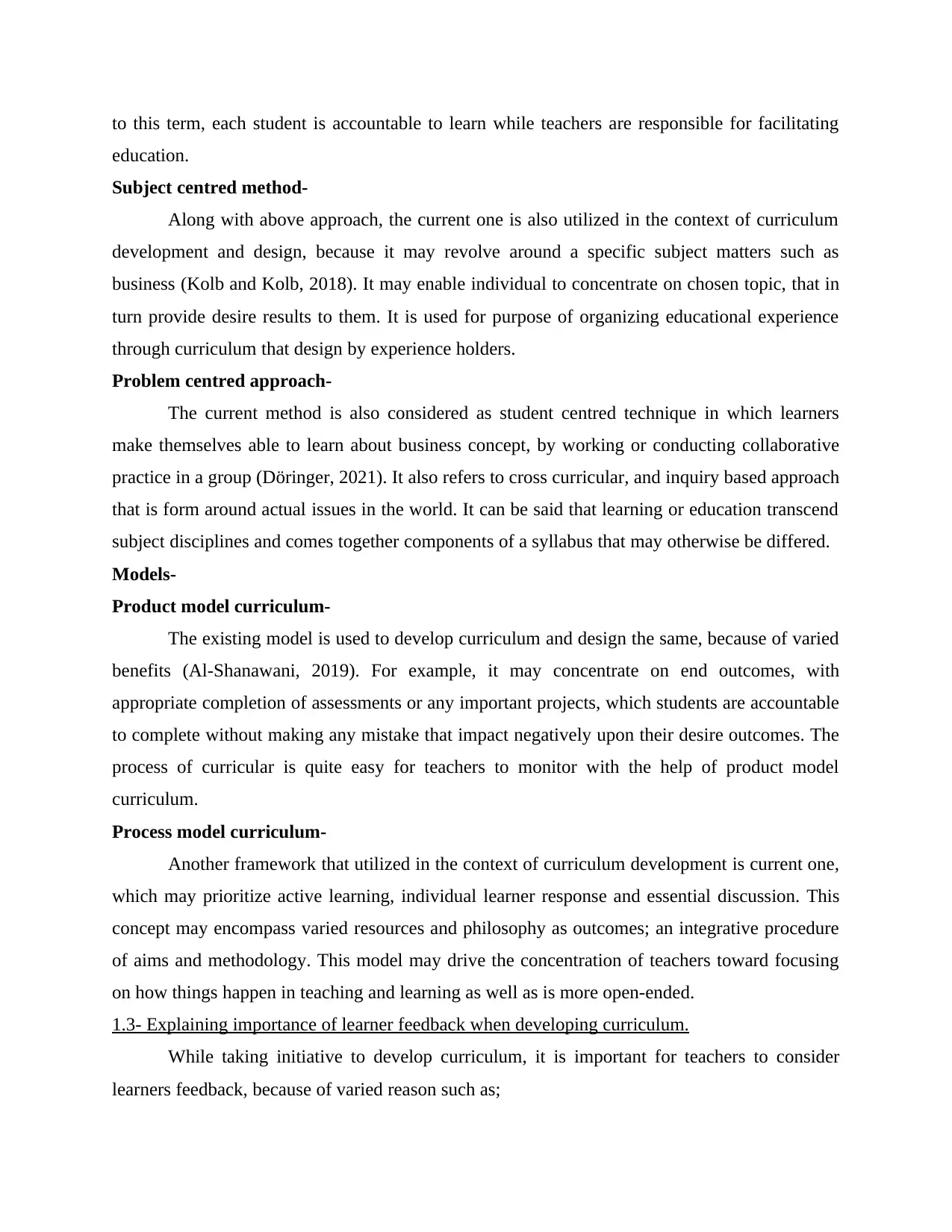
to this term, each student is accountable to learn while teachers are responsible for facilitating
education.
Subject centred method-
Along with above approach, the current one is also utilized in the context of curriculum
development and design, because it may revolve around a specific subject matters such as
business (Kolb and Kolb, 2018). It may enable individual to concentrate on chosen topic, that in
turn provide desire results to them. It is used for purpose of organizing educational experience
through curriculum that design by experience holders.
Problem centred approach-
The current method is also considered as student centred technique in which learners
make themselves able to learn about business concept, by working or conducting collaborative
practice in a group (Döringer, 2021). It also refers to cross curricular, and inquiry based approach
that is form around actual issues in the world. It can be said that learning or education transcend
subject disciplines and comes together components of a syllabus that may otherwise be differed.
Models-
Product model curriculum-
The existing model is used to develop curriculum and design the same, because of varied
benefits (Al-Shanawani, 2019). For example, it may concentrate on end outcomes, with
appropriate completion of assessments or any important projects, which students are accountable
to complete without making any mistake that impact negatively upon their desire outcomes. The
process of curricular is quite easy for teachers to monitor with the help of product model
curriculum.
Process model curriculum-
Another framework that utilized in the context of curriculum development is current one,
which may prioritize active learning, individual learner response and essential discussion. This
concept may encompass varied resources and philosophy as outcomes; an integrative procedure
of aims and methodology. This model may drive the concentration of teachers toward focusing
on how things happen in teaching and learning as well as is more open-ended.
1.3- Explaining importance of learner feedback when developing curriculum.
While taking initiative to develop curriculum, it is important for teachers to consider
learners feedback, because of varied reason such as;
education.
Subject centred method-
Along with above approach, the current one is also utilized in the context of curriculum
development and design, because it may revolve around a specific subject matters such as
business (Kolb and Kolb, 2018). It may enable individual to concentrate on chosen topic, that in
turn provide desire results to them. It is used for purpose of organizing educational experience
through curriculum that design by experience holders.
Problem centred approach-
The current method is also considered as student centred technique in which learners
make themselves able to learn about business concept, by working or conducting collaborative
practice in a group (Döringer, 2021). It also refers to cross curricular, and inquiry based approach
that is form around actual issues in the world. It can be said that learning or education transcend
subject disciplines and comes together components of a syllabus that may otherwise be differed.
Models-
Product model curriculum-
The existing model is used to develop curriculum and design the same, because of varied
benefits (Al-Shanawani, 2019). For example, it may concentrate on end outcomes, with
appropriate completion of assessments or any important projects, which students are accountable
to complete without making any mistake that impact negatively upon their desire outcomes. The
process of curricular is quite easy for teachers to monitor with the help of product model
curriculum.
Process model curriculum-
Another framework that utilized in the context of curriculum development is current one,
which may prioritize active learning, individual learner response and essential discussion. This
concept may encompass varied resources and philosophy as outcomes; an integrative procedure
of aims and methodology. This model may drive the concentration of teachers toward focusing
on how things happen in teaching and learning as well as is more open-ended.
1.3- Explaining importance of learner feedback when developing curriculum.
While taking initiative to develop curriculum, it is important for teachers to consider
learners feedback, because of varied reason such as;
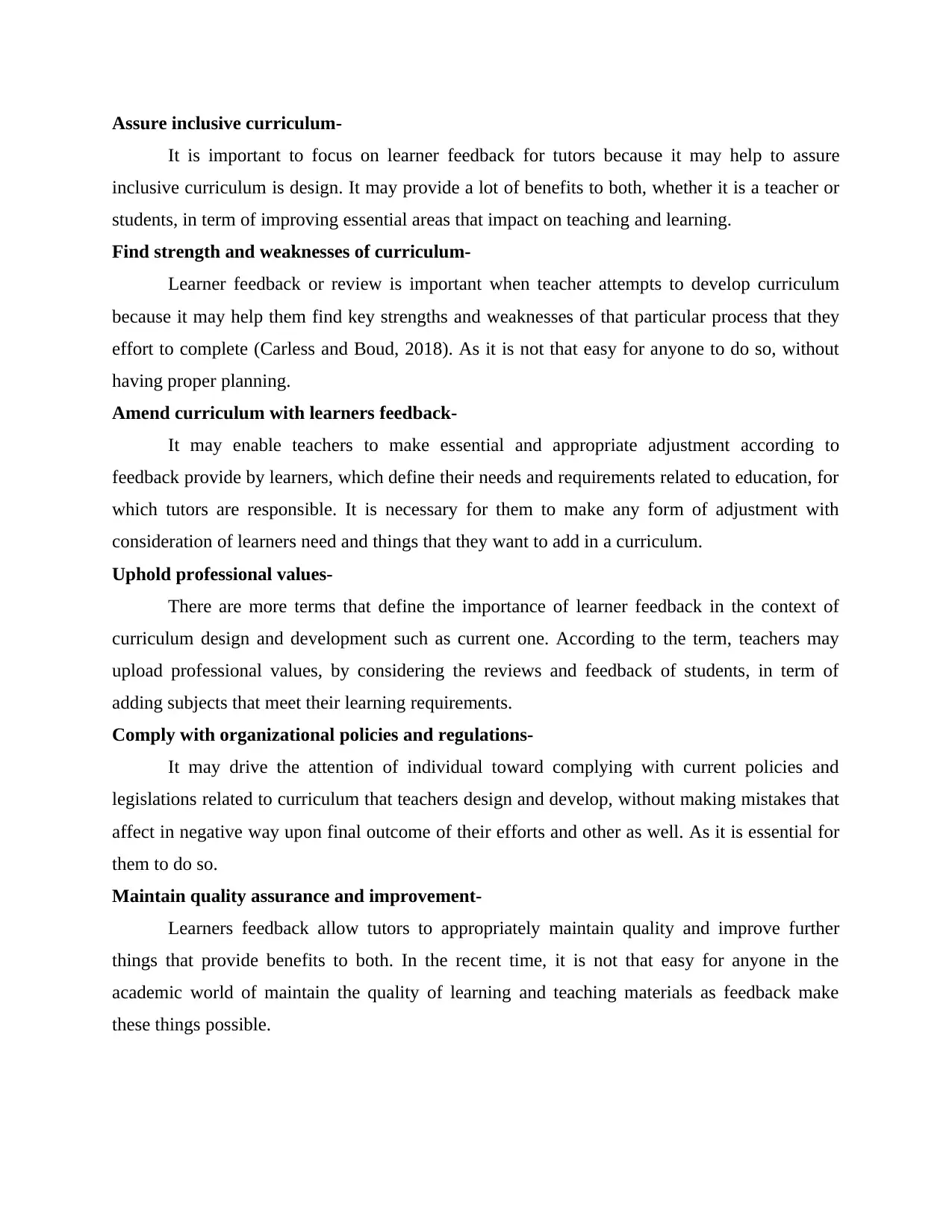
Assure inclusive curriculum-
It is important to focus on learner feedback for tutors because it may help to assure
inclusive curriculum is design. It may provide a lot of benefits to both, whether it is a teacher or
students, in term of improving essential areas that impact on teaching and learning.
Find strength and weaknesses of curriculum-
Learner feedback or review is important when teacher attempts to develop curriculum
because it may help them find key strengths and weaknesses of that particular process that they
effort to complete (Carless and Boud, 2018). As it is not that easy for anyone to do so, without
having proper planning.
Amend curriculum with learners feedback-
It may enable teachers to make essential and appropriate adjustment according to
feedback provide by learners, which define their needs and requirements related to education, for
which tutors are responsible. It is necessary for them to make any form of adjustment with
consideration of learners need and things that they want to add in a curriculum.
Uphold professional values-
There are more terms that define the importance of learner feedback in the context of
curriculum design and development such as current one. According to the term, teachers may
upload professional values, by considering the reviews and feedback of students, in term of
adding subjects that meet their learning requirements.
Comply with organizational policies and regulations-
It may drive the attention of individual toward complying with current policies and
legislations related to curriculum that teachers design and develop, without making mistakes that
affect in negative way upon final outcome of their efforts and other as well. As it is essential for
them to do so.
Maintain quality assurance and improvement-
Learners feedback allow tutors to appropriately maintain quality and improve further
things that provide benefits to both. In the recent time, it is not that easy for anyone in the
academic world of maintain the quality of learning and teaching materials as feedback make
these things possible.
It is important to focus on learner feedback for tutors because it may help to assure
inclusive curriculum is design. It may provide a lot of benefits to both, whether it is a teacher or
students, in term of improving essential areas that impact on teaching and learning.
Find strength and weaknesses of curriculum-
Learner feedback or review is important when teacher attempts to develop curriculum
because it may help them find key strengths and weaknesses of that particular process that they
effort to complete (Carless and Boud, 2018). As it is not that easy for anyone to do so, without
having proper planning.
Amend curriculum with learners feedback-
It may enable teachers to make essential and appropriate adjustment according to
feedback provide by learners, which define their needs and requirements related to education, for
which tutors are responsible. It is necessary for them to make any form of adjustment with
consideration of learners need and things that they want to add in a curriculum.
Uphold professional values-
There are more terms that define the importance of learner feedback in the context of
curriculum design and development such as current one. According to the term, teachers may
upload professional values, by considering the reviews and feedback of students, in term of
adding subjects that meet their learning requirements.
Comply with organizational policies and regulations-
It may drive the attention of individual toward complying with current policies and
legislations related to curriculum that teachers design and develop, without making mistakes that
affect in negative way upon final outcome of their efforts and other as well. As it is essential for
them to do so.
Maintain quality assurance and improvement-
Learners feedback allow tutors to appropriately maintain quality and improve further
things that provide benefits to both. In the recent time, it is not that easy for anyone in the
academic world of maintain the quality of learning and teaching materials as feedback make
these things possible.
⊘ This is a preview!⊘
Do you want full access?
Subscribe today to unlock all pages.

Trusted by 1+ million students worldwide
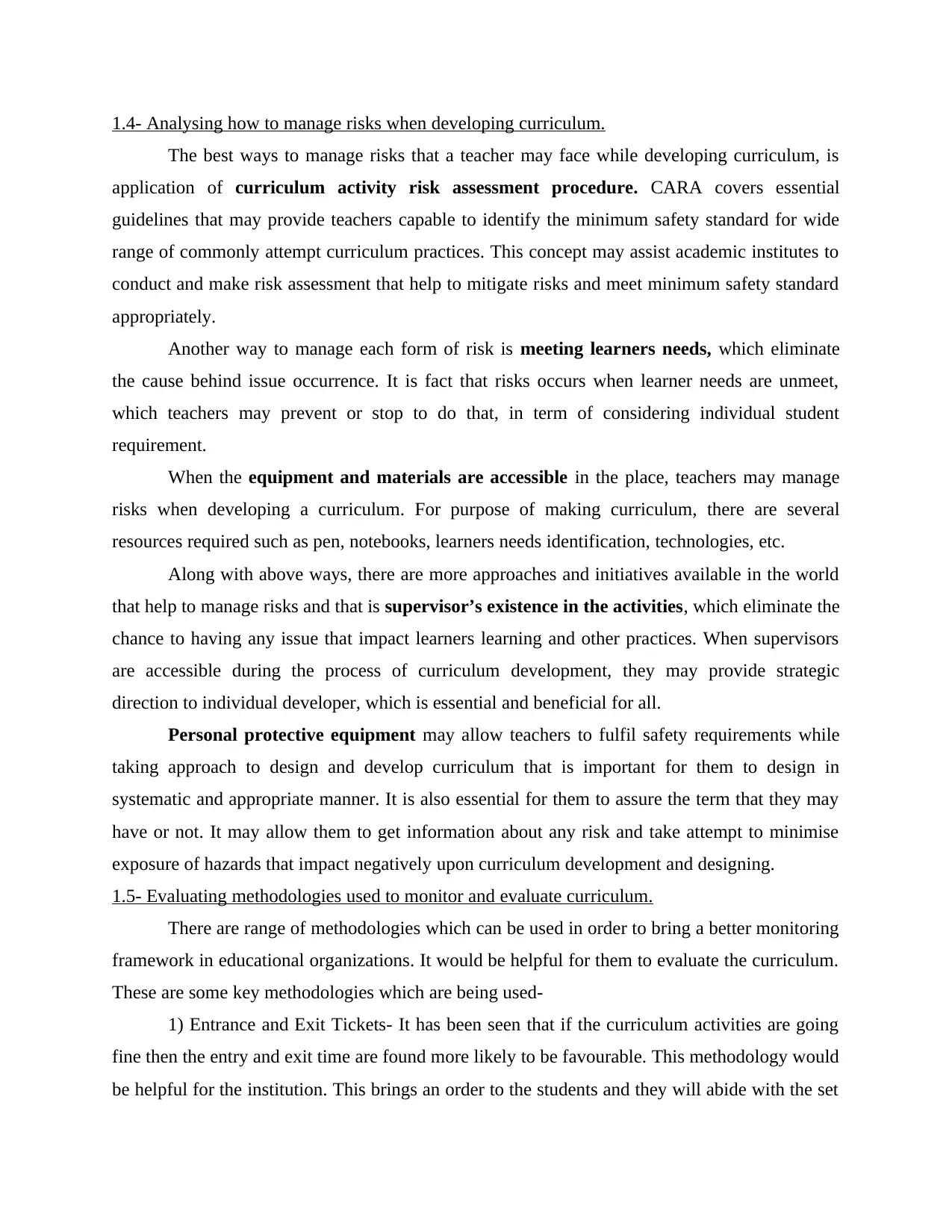
1.4- Analysing how to manage risks when developing curriculum.
The best ways to manage risks that a teacher may face while developing curriculum, is
application of curriculum activity risk assessment procedure. CARA covers essential
guidelines that may provide teachers capable to identify the minimum safety standard for wide
range of commonly attempt curriculum practices. This concept may assist academic institutes to
conduct and make risk assessment that help to mitigate risks and meet minimum safety standard
appropriately.
Another way to manage each form of risk is meeting learners needs, which eliminate
the cause behind issue occurrence. It is fact that risks occurs when learner needs are unmeet,
which teachers may prevent or stop to do that, in term of considering individual student
requirement.
When the equipment and materials are accessible in the place, teachers may manage
risks when developing a curriculum. For purpose of making curriculum, there are several
resources required such as pen, notebooks, learners needs identification, technologies, etc.
Along with above ways, there are more approaches and initiatives available in the world
that help to manage risks and that is supervisor’s existence in the activities, which eliminate the
chance to having any issue that impact learners learning and other practices. When supervisors
are accessible during the process of curriculum development, they may provide strategic
direction to individual developer, which is essential and beneficial for all.
Personal protective equipment may allow teachers to fulfil safety requirements while
taking approach to design and develop curriculum that is important for them to design in
systematic and appropriate manner. It is also essential for them to assure the term that they may
have or not. It may allow them to get information about any risk and take attempt to minimise
exposure of hazards that impact negatively upon curriculum development and designing.
1.5- Evaluating methodologies used to monitor and evaluate curriculum.
There are range of methodologies which can be used in order to bring a better monitoring
framework in educational organizations. It would be helpful for them to evaluate the curriculum.
These are some key methodologies which are being used-
1) Entrance and Exit Tickets- It has been seen that if the curriculum activities are going
fine then the entry and exit time are found more likely to be favourable. This methodology would
be helpful for the institution. This brings an order to the students and they will abide with the set
The best ways to manage risks that a teacher may face while developing curriculum, is
application of curriculum activity risk assessment procedure. CARA covers essential
guidelines that may provide teachers capable to identify the minimum safety standard for wide
range of commonly attempt curriculum practices. This concept may assist academic institutes to
conduct and make risk assessment that help to mitigate risks and meet minimum safety standard
appropriately.
Another way to manage each form of risk is meeting learners needs, which eliminate
the cause behind issue occurrence. It is fact that risks occurs when learner needs are unmeet,
which teachers may prevent or stop to do that, in term of considering individual student
requirement.
When the equipment and materials are accessible in the place, teachers may manage
risks when developing a curriculum. For purpose of making curriculum, there are several
resources required such as pen, notebooks, learners needs identification, technologies, etc.
Along with above ways, there are more approaches and initiatives available in the world
that help to manage risks and that is supervisor’s existence in the activities, which eliminate the
chance to having any issue that impact learners learning and other practices. When supervisors
are accessible during the process of curriculum development, they may provide strategic
direction to individual developer, which is essential and beneficial for all.
Personal protective equipment may allow teachers to fulfil safety requirements while
taking approach to design and develop curriculum that is important for them to design in
systematic and appropriate manner. It is also essential for them to assure the term that they may
have or not. It may allow them to get information about any risk and take attempt to minimise
exposure of hazards that impact negatively upon curriculum development and designing.
1.5- Evaluating methodologies used to monitor and evaluate curriculum.
There are range of methodologies which can be used in order to bring a better monitoring
framework in educational organizations. It would be helpful for them to evaluate the curriculum.
These are some key methodologies which are being used-
1) Entrance and Exit Tickets- It has been seen that if the curriculum activities are going
fine then the entry and exit time are found more likely to be favourable. This methodology would
be helpful for the institution. This brings an order to the students and they will abide with the set
Paraphrase This Document
Need a fresh take? Get an instant paraphrase of this document with our AI Paraphraser
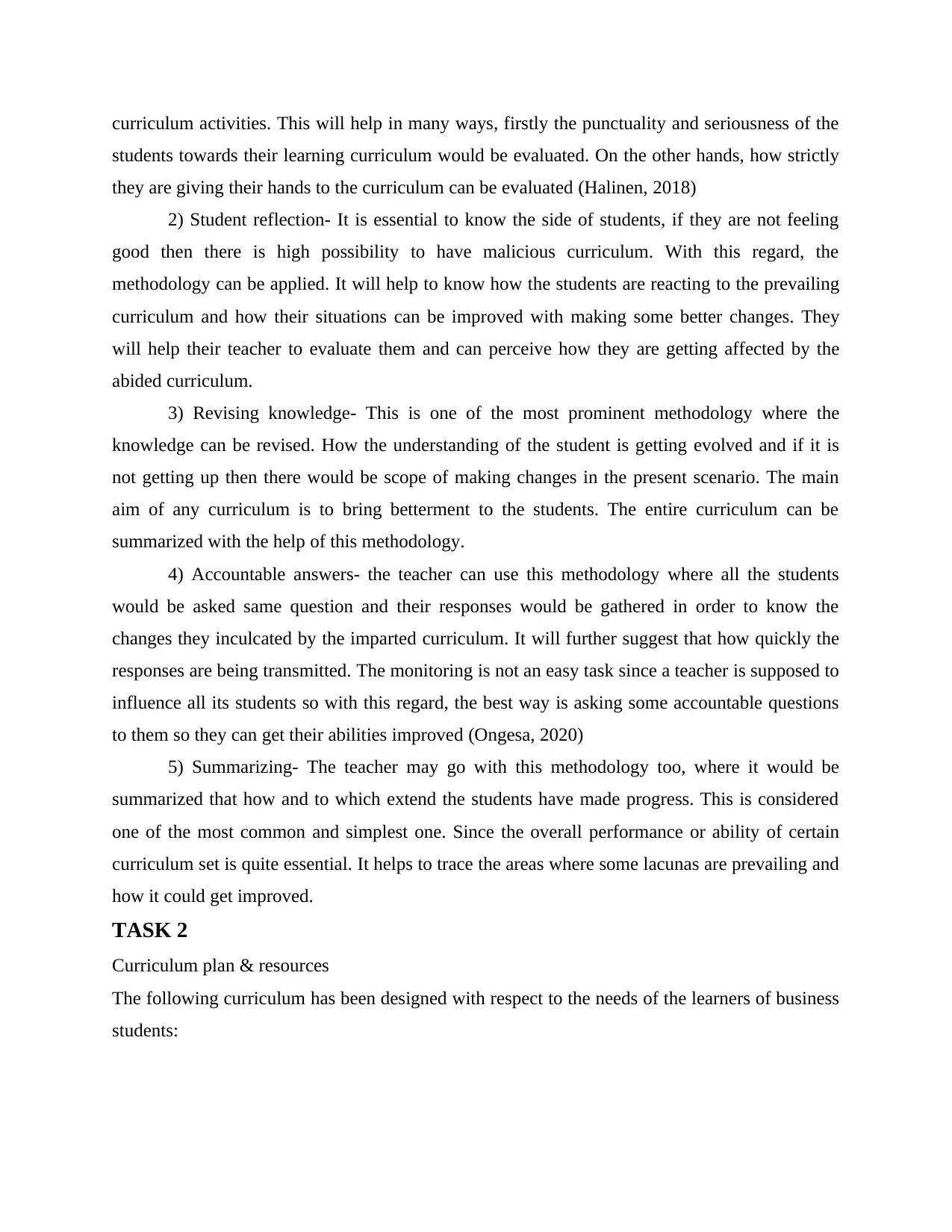
curriculum activities. This will help in many ways, firstly the punctuality and seriousness of the
students towards their learning curriculum would be evaluated. On the other hands, how strictly
they are giving their hands to the curriculum can be evaluated (Halinen, 2018)
2) Student reflection- It is essential to know the side of students, if they are not feeling
good then there is high possibility to have malicious curriculum. With this regard, the
methodology can be applied. It will help to know how the students are reacting to the prevailing
curriculum and how their situations can be improved with making some better changes. They
will help their teacher to evaluate them and can perceive how they are getting affected by the
abided curriculum.
3) Revising knowledge- This is one of the most prominent methodology where the
knowledge can be revised. How the understanding of the student is getting evolved and if it is
not getting up then there would be scope of making changes in the present scenario. The main
aim of any curriculum is to bring betterment to the students. The entire curriculum can be
summarized with the help of this methodology.
4) Accountable answers- the teacher can use this methodology where all the students
would be asked same question and their responses would be gathered in order to know the
changes they inculcated by the imparted curriculum. It will further suggest that how quickly the
responses are being transmitted. The monitoring is not an easy task since a teacher is supposed to
influence all its students so with this regard, the best way is asking some accountable questions
to them so they can get their abilities improved (Ongesa, 2020)
5) Summarizing- The teacher may go with this methodology too, where it would be
summarized that how and to which extend the students have made progress. This is considered
one of the most common and simplest one. Since the overall performance or ability of certain
curriculum set is quite essential. It helps to trace the areas where some lacunas are prevailing and
how it could get improved.
TASK 2
Curriculum plan & resources
The following curriculum has been designed with respect to the needs of the learners of business
students:
students towards their learning curriculum would be evaluated. On the other hands, how strictly
they are giving their hands to the curriculum can be evaluated (Halinen, 2018)
2) Student reflection- It is essential to know the side of students, if they are not feeling
good then there is high possibility to have malicious curriculum. With this regard, the
methodology can be applied. It will help to know how the students are reacting to the prevailing
curriculum and how their situations can be improved with making some better changes. They
will help their teacher to evaluate them and can perceive how they are getting affected by the
abided curriculum.
3) Revising knowledge- This is one of the most prominent methodology where the
knowledge can be revised. How the understanding of the student is getting evolved and if it is
not getting up then there would be scope of making changes in the present scenario. The main
aim of any curriculum is to bring betterment to the students. The entire curriculum can be
summarized with the help of this methodology.
4) Accountable answers- the teacher can use this methodology where all the students
would be asked same question and their responses would be gathered in order to know the
changes they inculcated by the imparted curriculum. It will further suggest that how quickly the
responses are being transmitted. The monitoring is not an easy task since a teacher is supposed to
influence all its students so with this regard, the best way is asking some accountable questions
to them so they can get their abilities improved (Ongesa, 2020)
5) Summarizing- The teacher may go with this methodology too, where it would be
summarized that how and to which extend the students have made progress. This is considered
one of the most common and simplest one. Since the overall performance or ability of certain
curriculum set is quite essential. It helps to trace the areas where some lacunas are prevailing and
how it could get improved.
TASK 2
Curriculum plan & resources
The following curriculum has been designed with respect to the needs of the learners of business
students:
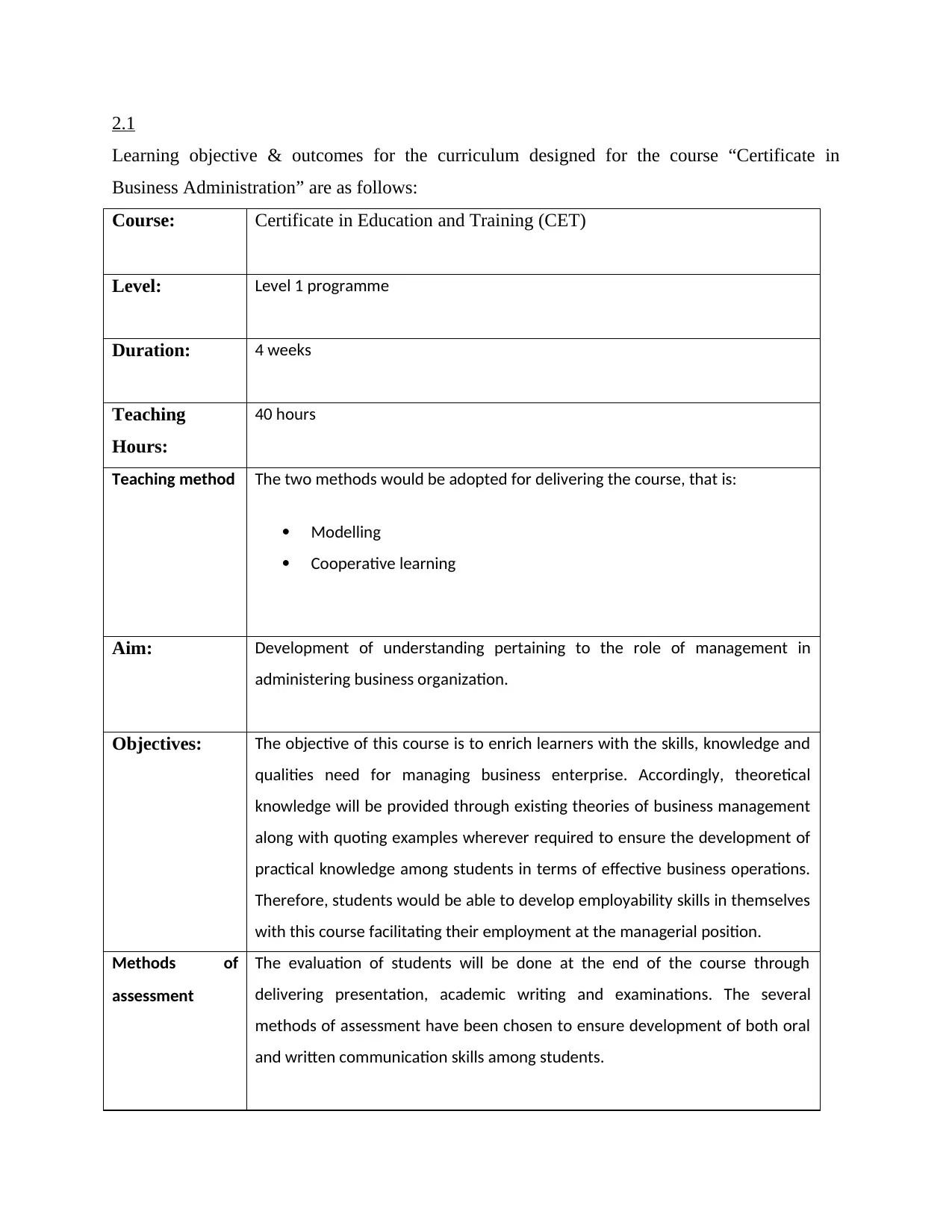
2.1
Learning objective & outcomes for the curriculum designed for the course “Certificate in
Business Administration” are as follows:
Course: Certificate in Education and Training (CET)
Level: Level 1 programme
Duration: 4 weeks
Teaching
Hours:
40 hours
Teaching method The two methods would be adopted for delivering the course, that is:
Modelling
Cooperative learning
Aim: Development of understanding pertaining to the role of management in
administering business organization.
Objectives: The objective of this course is to enrich learners with the skills, knowledge and
qualities need for managing business enterprise. Accordingly, theoretical
knowledge will be provided through existing theories of business management
along with quoting examples wherever required to ensure the development of
practical knowledge among students in terms of effective business operations.
Therefore, students would be able to develop employability skills in themselves
with this course facilitating their employment at the managerial position.
Methods of
assessment
The evaluation of students will be done at the end of the course through
delivering presentation, academic writing and examinations. The several
methods of assessment have been chosen to ensure development of both oral
and written communication skills among students.
Learning objective & outcomes for the curriculum designed for the course “Certificate in
Business Administration” are as follows:
Course: Certificate in Education and Training (CET)
Level: Level 1 programme
Duration: 4 weeks
Teaching
Hours:
40 hours
Teaching method The two methods would be adopted for delivering the course, that is:
Modelling
Cooperative learning
Aim: Development of understanding pertaining to the role of management in
administering business organization.
Objectives: The objective of this course is to enrich learners with the skills, knowledge and
qualities need for managing business enterprise. Accordingly, theoretical
knowledge will be provided through existing theories of business management
along with quoting examples wherever required to ensure the development of
practical knowledge among students in terms of effective business operations.
Therefore, students would be able to develop employability skills in themselves
with this course facilitating their employment at the managerial position.
Methods of
assessment
The evaluation of students will be done at the end of the course through
delivering presentation, academic writing and examinations. The several
methods of assessment have been chosen to ensure development of both oral
and written communication skills among students.
⊘ This is a preview!⊘
Do you want full access?
Subscribe today to unlock all pages.

Trusted by 1+ million students worldwide
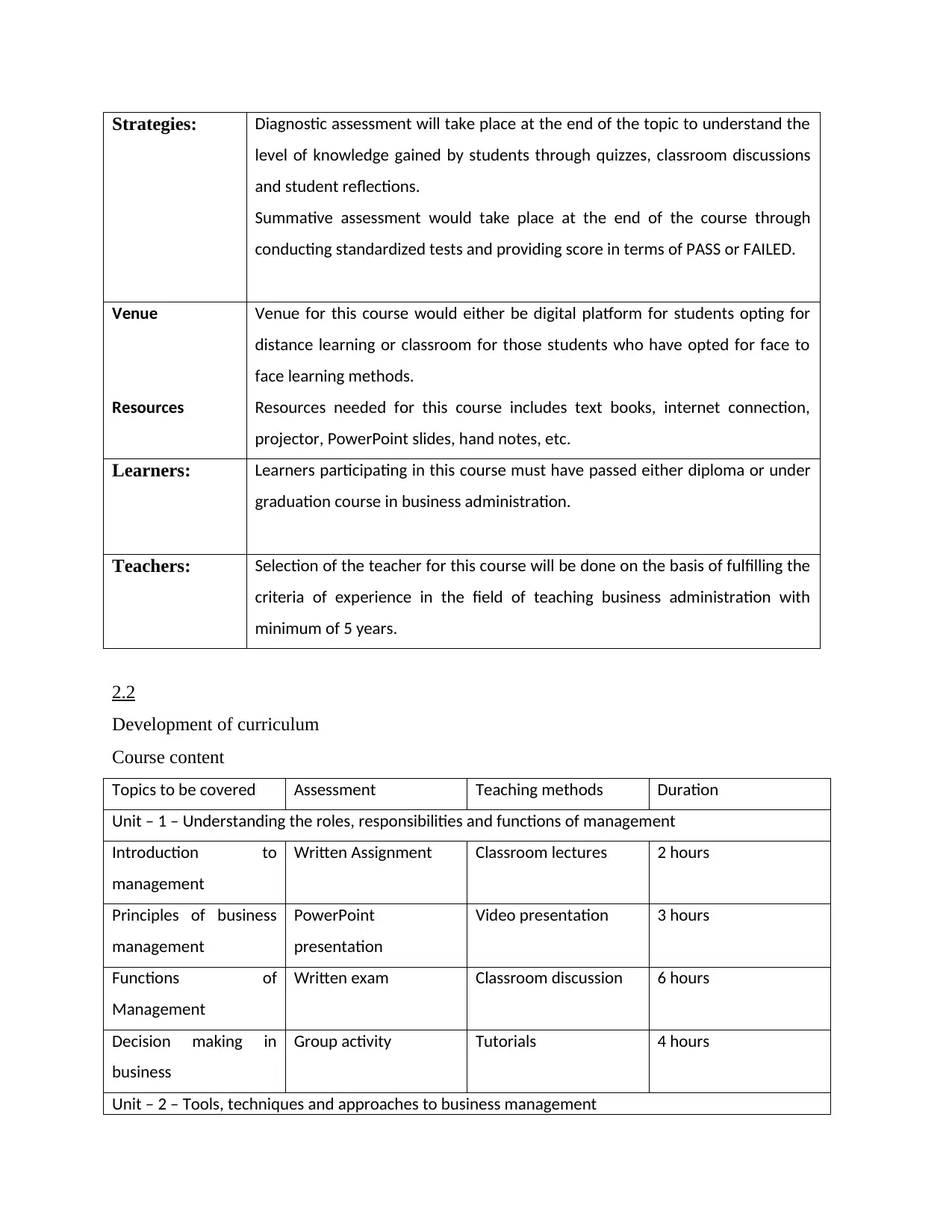
Strategies: Diagnostic assessment will take place at the end of the topic to understand the
level of knowledge gained by students through quizzes, classroom discussions
and student reflections.
Summative assessment would take place at the end of the course through
conducting standardized tests and providing score in terms of PASS or FAILED.
Venue
Resources
Venue for this course would either be digital platform for students opting for
distance learning or classroom for those students who have opted for face to
face learning methods.
Resources needed for this course includes text books, internet connection,
projector, PowerPoint slides, hand notes, etc.
Learners: Learners participating in this course must have passed either diploma or under
graduation course in business administration.
Teachers: Selection of the teacher for this course will be done on the basis of fulfilling the
criteria of experience in the field of teaching business administration with
minimum of 5 years.
2.2
Development of curriculum
Course content
Topics to be covered Assessment Teaching methods Duration
Unit – 1 – Understanding the roles, responsibilities and functions of management
Introduction to
management
Written Assignment Classroom lectures 2 hours
Principles of business
management
PowerPoint
presentation
Video presentation 3 hours
Functions of
Management
Written exam Classroom discussion 6 hours
Decision making in
business
Group activity Tutorials 4 hours
Unit – 2 – Tools, techniques and approaches to business management
level of knowledge gained by students through quizzes, classroom discussions
and student reflections.
Summative assessment would take place at the end of the course through
conducting standardized tests and providing score in terms of PASS or FAILED.
Venue
Resources
Venue for this course would either be digital platform for students opting for
distance learning or classroom for those students who have opted for face to
face learning methods.
Resources needed for this course includes text books, internet connection,
projector, PowerPoint slides, hand notes, etc.
Learners: Learners participating in this course must have passed either diploma or under
graduation course in business administration.
Teachers: Selection of the teacher for this course will be done on the basis of fulfilling the
criteria of experience in the field of teaching business administration with
minimum of 5 years.
2.2
Development of curriculum
Course content
Topics to be covered Assessment Teaching methods Duration
Unit – 1 – Understanding the roles, responsibilities and functions of management
Introduction to
management
Written Assignment Classroom lectures 2 hours
Principles of business
management
PowerPoint
presentation
Video presentation 3 hours
Functions of
Management
Written exam Classroom discussion 6 hours
Decision making in
business
Group activity Tutorials 4 hours
Unit – 2 – Tools, techniques and approaches to business management
Paraphrase This Document
Need a fresh take? Get an instant paraphrase of this document with our AI Paraphraser
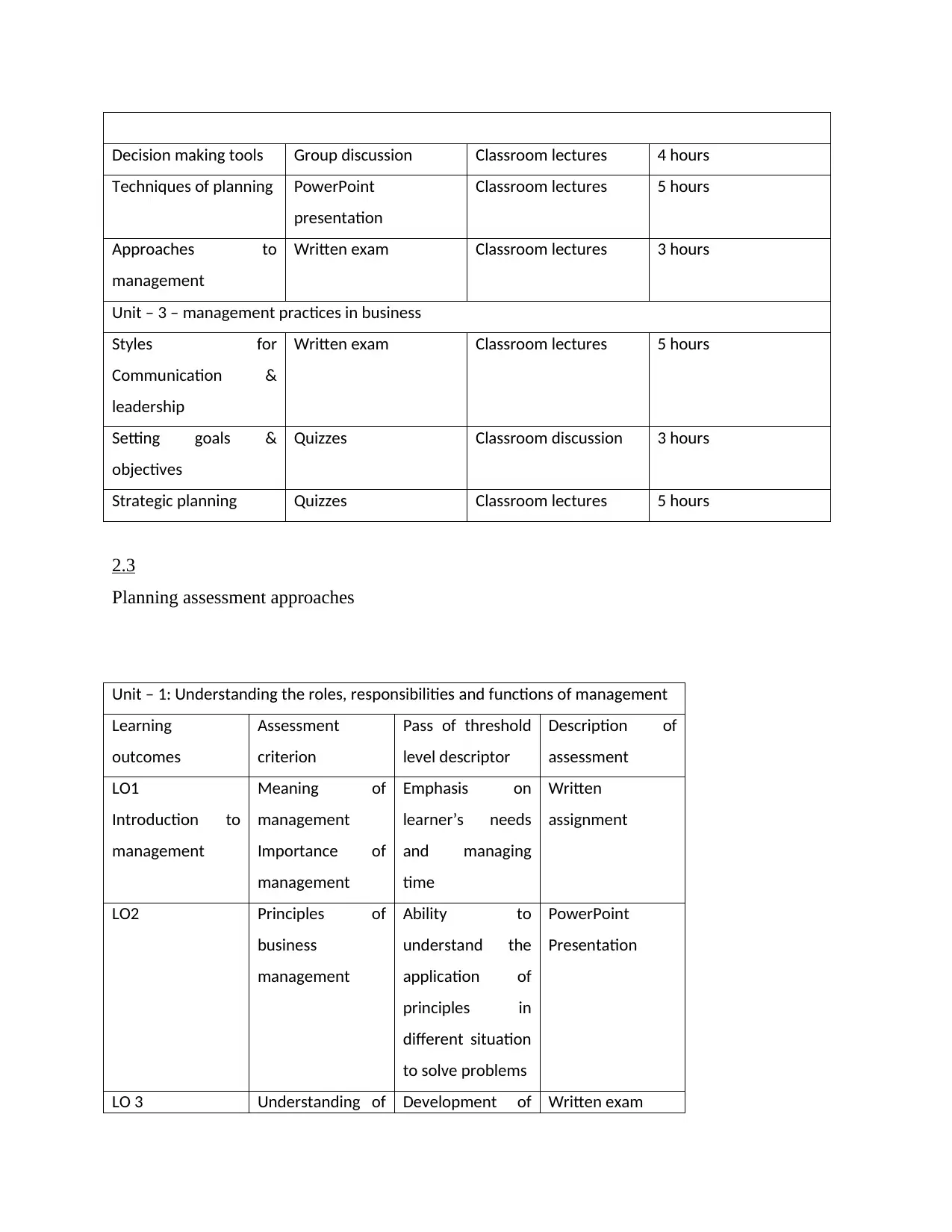
Decision making tools Group discussion Classroom lectures 4 hours
Techniques of planning PowerPoint
presentation
Classroom lectures 5 hours
Approaches to
management
Written exam Classroom lectures 3 hours
Unit – 3 – management practices in business
Styles for
Communication &
leadership
Written exam Classroom lectures 5 hours
Setting goals &
objectives
Quizzes Classroom discussion 3 hours
Strategic planning Quizzes Classroom lectures 5 hours
2.3
Planning assessment approaches
Unit – 1: Understanding the roles, responsibilities and functions of management
Learning
outcomes
Assessment
criterion
Pass of threshold
level descriptor
Description of
assessment
LO1
Introduction to
management
Meaning of
management
Importance of
management
Emphasis on
learner’s needs
and managing
time
Written
assignment
LO2 Principles of
business
management
Ability to
understand the
application of
principles in
different situation
to solve problems
PowerPoint
Presentation
LO 3 Understanding of Development of Written exam
Techniques of planning PowerPoint
presentation
Classroom lectures 5 hours
Approaches to
management
Written exam Classroom lectures 3 hours
Unit – 3 – management practices in business
Styles for
Communication &
leadership
Written exam Classroom lectures 5 hours
Setting goals &
objectives
Quizzes Classroom discussion 3 hours
Strategic planning Quizzes Classroom lectures 5 hours
2.3
Planning assessment approaches
Unit – 1: Understanding the roles, responsibilities and functions of management
Learning
outcomes
Assessment
criterion
Pass of threshold
level descriptor
Description of
assessment
LO1
Introduction to
management
Meaning of
management
Importance of
management
Emphasis on
learner’s needs
and managing
time
Written
assignment
LO2 Principles of
business
management
Ability to
understand the
application of
principles in
different situation
to solve problems
PowerPoint
Presentation
LO 3 Understanding of Development of Written exam
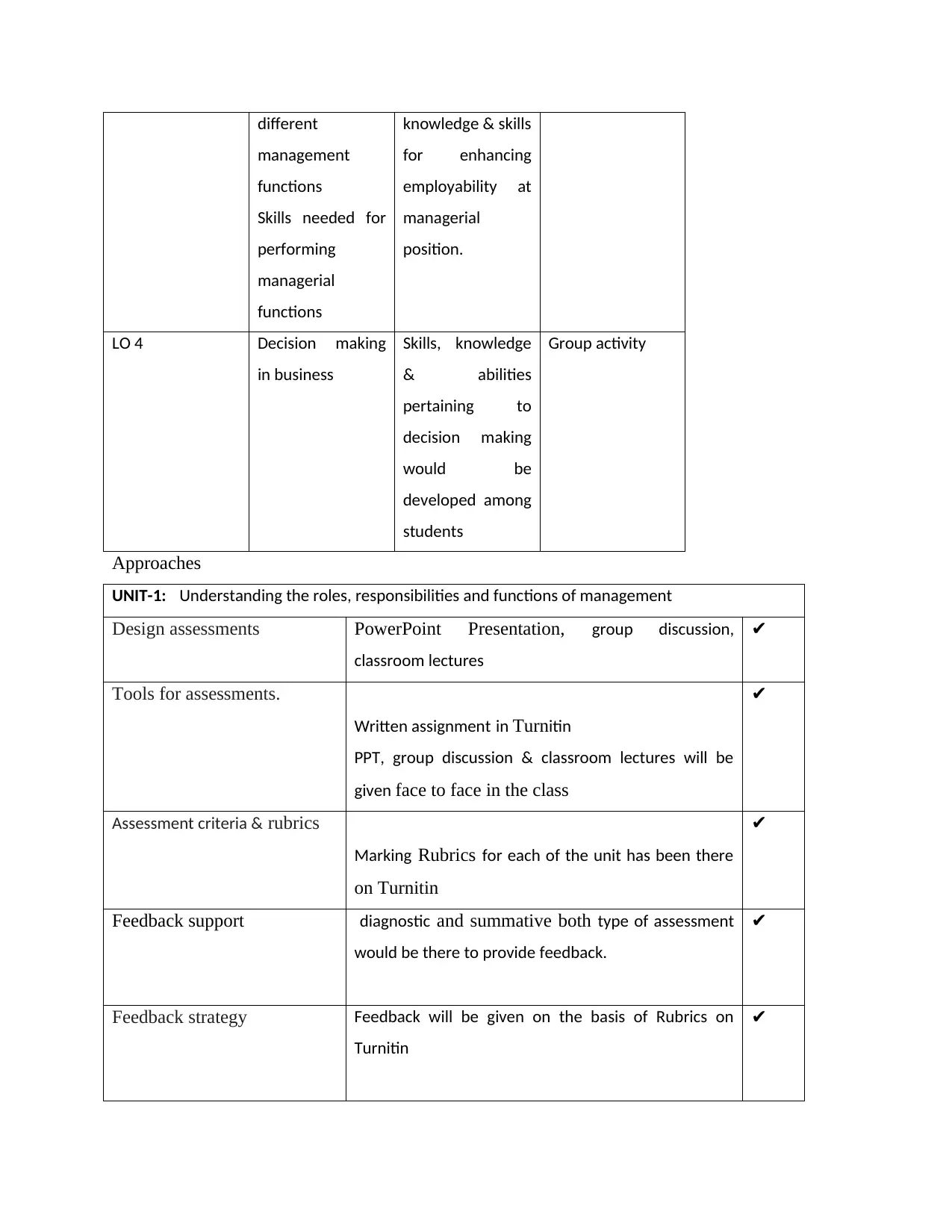
different
management
functions
Skills needed for
performing
managerial
functions
knowledge & skills
for enhancing
employability at
managerial
position.
LO 4 Decision making
in business
Skills, knowledge
& abilities
pertaining to
decision making
would be
developed among
students
Group activity
Approaches
UNIT-1: Understanding the roles, responsibilities and functions of management
Design assessments PowerPoint Presentation, group discussion,
classroom lectures
✔
Tools for assessments.
Written assignment in Turnitin
PPT, group discussion & classroom lectures will be
given face to face in the class
✔
Assessment criteria & rubrics
Marking Rubrics for each of the unit has been there
on Turnitin
✔
Feedback support diagnostic and summative both type of assessment
would be there to provide feedback.
✔
Feedback strategy Feedback will be given on the basis of Rubrics on
Turnitin
✔
management
functions
Skills needed for
performing
managerial
functions
knowledge & skills
for enhancing
employability at
managerial
position.
LO 4 Decision making
in business
Skills, knowledge
& abilities
pertaining to
decision making
would be
developed among
students
Group activity
Approaches
UNIT-1: Understanding the roles, responsibilities and functions of management
Design assessments PowerPoint Presentation, group discussion,
classroom lectures
✔
Tools for assessments.
Written assignment in Turnitin
PPT, group discussion & classroom lectures will be
given face to face in the class
✔
Assessment criteria & rubrics
Marking Rubrics for each of the unit has been there
on Turnitin
✔
Feedback support diagnostic and summative both type of assessment
would be there to provide feedback.
✔
Feedback strategy Feedback will be given on the basis of Rubrics on
Turnitin
✔
⊘ This is a preview!⊘
Do you want full access?
Subscribe today to unlock all pages.

Trusted by 1+ million students worldwide
1 out of 21
Related Documents
Your All-in-One AI-Powered Toolkit for Academic Success.
+13062052269
info@desklib.com
Available 24*7 on WhatsApp / Email
![[object Object]](/_next/static/media/star-bottom.7253800d.svg)
Unlock your academic potential
Copyright © 2020–2026 A2Z Services. All Rights Reserved. Developed and managed by ZUCOL.


